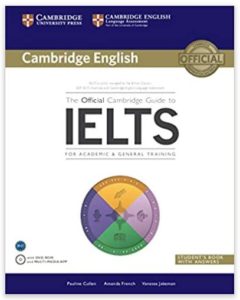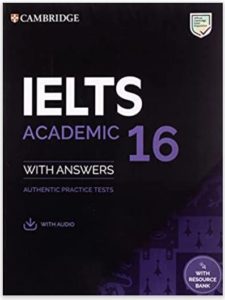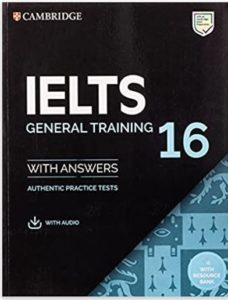7 Steps to Achieving A Band 7 (Or Higher) IELTS Score
Achieving a high IELTS band score requires strategic preparation and practice. One of the most common questions test takers ask is how to get a band 7 in IELTS?
Based on my experience and those of my students, I’ve put together a list of 7 steps that successful IELTS students follow to get a band 7, 8 or 9.
But before we look into these 7 steps, let us discuss why you need to aim for at least a band 7 on your IELTS test.
Why Aim For A Band 7 or Higher?
Are you a student looking to study abroad? Or an aspiring immigrant looking to build a better life in a country of your dreams?
Whatever your reason to take the IELTS test, getting a band 7 or higher on your IELTS will open doors to the best the world has to offer.
If you are a student, an IELTS band score of 7 or higher can put you ahead of hundreds of applicants seeking admission at the University of your choice.
Also, it can potentially qualify you for a job as a Teaching or Reasearch Assistant, while you study.
Teaching and Reasearch Assistantships are reserved for top candidates and usually come with perks such as 50% less tuition and a monthly stipend of $1500 – $2500.
In other words, a high IELTS band score can potentially save you thousands of dollars in tuition fees and provide a chance to work with the best minds at your future University.
If you are an aspiring immigrant seeking to immigrate to countries with a point based immigration system like Canada, an IELTS band 7 or higher may not only be desired, but a required criteria for qualification.
On that note, let us look into the 7 steps to achieving a band 7 IELTS score.
7 Steps To A Band 7 (Or Higher) IELTS Score –
- Understand the test pattern and question types.
- Know where you stand.
- Give yourself sufficient time to prepare.
- Take practice tests under exam conditions.
- Identify areas you need to work on.
- Understand the grading criteria.
- Get feedback on your writing from expreinced IELTS teachers.
1. UNDERSTAND THE TEST PATTERN AND QUESTION TYPES
The first and most important step in your IELTS preparation journey is rather obvious – getting to know the test pattern and question types.
As obvious as it is, an astounding number of students enter the exam hall without familiarizing themselves with the test pattern and different question types.
The IELTS as you know has 4 sections – Listening, Reading, Writing and Speaking.
In order to be successful it is important that you are extremely familiar with the time alloted for each section, the number of questions, type of questions and strategies to answer each question.
For example, the listening section has 10 different question types that you can get on the test. The reading section has 14 different question types.
You need to be familiar with each question type and have strategies in place to answer them correctly within the alloted time.
You can learn more about the test pattern for both Academic and General Training IELTS by reading the article – Everything you need to know about the IELTS test.
2. KNOW WHERE YOU STAND
Achieving any goal in life comes down to one simple fact – Knowing where you stand today and understanding what you need to do to get where you want to go.
Now that you know your goal – achieving a band 7 or higher on your IELTS test – the first thing you need to do is to get to know your current level of English.
The best way to find out your current level of English is to take a full length IELTS practice test from an authentic source and have it graded from an expreienced IELTS coach or examiner.
The internet is filled with scamy websites that offer IELTS practice tests. They are not an accurate representation of the real IELTS test and are highly unreliable.
Be sure to take practices tests only from authentic IELTS sources like Cambridge English, IDP or British Council.
The Listening and Reading sections can be self assessed with answer keys. For the Writing and Speaking sections however, you will need an experienced coach to grade your test and provide accurate feedback.
Writing and speaking sections on the IELTS are graded using a very specific set of criteria known as band descriptors. Due to the nuanced nature of these band descriptors, you will need an experienced IELTS coach to evaluate these sections for you.
Once you know your current standing, you will now be in a position to set your target band score. Also, you will gain a good understanding of your strengths and areas you need to improve.
It is very important that you set a realistic target band score and give yourself sufficient time to prepare.
3. GIVE YOURSELF SUFFICIENT TIME TO PREPARE
Once you know your target band score, the next step is to establish an appropriate timeline for your test preparation giving yourself sufficient time to prepare.
But the question is how much time is sufficient? To be honest, that is a difficult question to answer.
The time and effort you need to achieve your target band score really depends on your current level of English and your individual strengths and weaknesses.
According to a study done by IELTS, it takes on average 200 hours of focused study to improve your IELTS score by one whole band ( e.g. 7 – 8).
That is, if you dedicate 25 hours of study per week, it will take you approximately 2 months to improve your score by a whole band.
Again, this is simply an estimate, and your individual case may be different. I advise my students typically starting at a band 6 to give themselves a minimum of 2 months to achieve a band 7 or higher.
Most IELTS test takers are full-time students or employees who do not have several hours per week for test preparation. If you are one of them, the most efficient way to prepare is by enrolling in a great online course.
Datum IELTS Academy’s Ultimate IELTS preparation course is specially designed for full-time students and employees preparing for the IELTS test.
It is a comprehensive course that covers the essentials of both Academic and General Training IELTS in short, easy to understand video lessons you can watch at your own pace.
Buying a great online course will not only fastrack your IELTS preparation, but also provide you with the motivation required to take your preparation seriously.
You can cut days off your IELTS preparation today. Join our Ultimate IELTS preparation course here.
4. TAKE PRACTICE TESTS UNDER EXAM CONDITIONS
Once you have spent sufficient time familiarizing yourself with test patterns and question types, the next step is to take practice tests from authentic IELTS sources.
The best source of IELTS practice tests are the Cambridge IELTS books.
The following Official IELTS books from Cambridge English contain authentic IELTS practice tests and are a must have reference books for every test taker –
In addition to these books there are several free official IELTS practice questions and tests available online. Here are some useful links to free official IELTS material –
- Free IELTS practice tests published by British Council
- Sample IELTS questions on ielts.org website
- Free practice tests and material by IDP Australia
I recommend my students to start off by taking pratice tests for each section i.e. Listening, Reading, Writing and Speaking separately to begin with, and then move on to full length practice tests with all four sections at a stretch.
There are two main reasons to take practice tests. One is to get yourself comfortable with the pace of the exam and the different question types on each section. The other more important reason is understand where you’re going wrong.
Which brings us to the next step for achieving a band score of 7 or higher – identifying areas you need to work on.
5. IDENTIFY AREAS YOU NEED TO WORK ON
It is very important that you get to know which sections and question types you struggle with the most. This will help you tweak your strategies to improve your score.
In my experience as an IELTS teacher, I’ve come across many students who take practice test after practice test without really spending time understanding where they’re going wrong.
The definition of insanity as they say, is doing the same thing again and again and expecting different results. Mindlessly taking practice test after practice test without really spending time analyzing your mistakes is no different.
At Datum IELTS Academy (our offline IELTS school), we teach a process we like to call iteration to success. We ask our students to take 2 or more practice tests on each section with the sole purpose of identifying areas they struggle with the most.
By the end of the exercise, they will have identified specific question types in each section that are holding back their score.
We teach them strategies to tackle these areas better and take more practice tests. This process is repeated until students move towards their target band score.
6. UNDERSTAND THE GRADING CRITERIA
The next step in acheiving a band score of 7 or higher is to gain a thorough understanding of the grading criteria.
For the Listening and Reading sections band scores are calculated based on the number of correct answers you manage to get out of the 40 questions on the test.
The following tables show the corresponding band scores for the number of correct answers on the Listening and Reading sections.
Listening Band Score Table
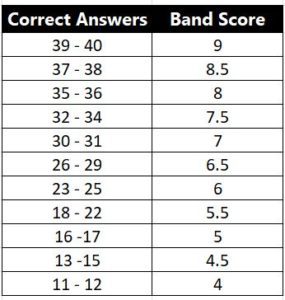

Reading Band Score Table – Academic
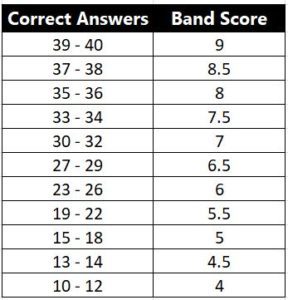

Reading Band Score Table – General Training
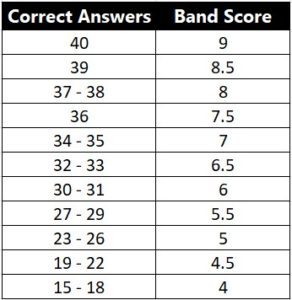

The grading criteria for the Writing and Speaking sections however are not so straight forward.
Writing band scores are calculated based on 4 different criteria –
- Task response.
- Coherence and Cohesion.
- Lexical Resource &
- Grammatical Range and Accuracy.
Speaking band scores are calculated based on 4 different criteria –
- Fluency and Coherence.
- Lexical Resource.
- Grammatical Range and Accuracy &
- Pronunciation.
Examiners use a detailed set of rules known as band descriptors to grade the response based on the 4 criteria mentioned above for the Writing and Speaking sections.
The real version of band descriptors used by IELTS examiners is kept secret by IELTS, however there are public versions of these descriptors made available. You can download them by clicking the links below
Writing Task 1 – Band descriptors
Writing Task 2 – Band descriptors
These public band descriptors provide a general guideline of what IELTS examiners are looking for on the Writing and Speaking tests.
In order to get a band score of 7 or higher, it is important that you study and understand these band descriptors. Explaining public band descriptors is beyond the scope of this article.
7. GET FEEDBACK ON YOUR WRITING FROM EXPERIENCED IELTS TEACHERS
Last but not the least, achieving a high IELTS band score comes down to doing well on each section of the test. If your score on one section suffers, it will drag down your overall band score.
It is a statistical fact that most IELTS students fail to get a band 7 or higher on the Writing section. And most of them do not really know why.
Without a thorough understanding of the band descriptors and knowing how to produce a response to meet the criteria mentioned in them, your Writing score will suffer.
I’ve come across many students repeating the IELTS test more than 3 times only because of a bad writing score. That is a lot of wasted time and money.
Let’s face it! most test takers are not great writers. A lot of us haven’t written an essay or a letter since high school. The most amount of writing we do on a daily basis is either email or text messages to our friends.
Producing high quality essays within a span of an hour to meet the nuanced requirements of IELTS is hard. Evaluating your own essays during preparation is harder.
IELTS examiners and teachers go through rigourous training to learn how to grade essays based on the band descriptors.
Getting feedback on your essays from a trained IELTS teacher during your preparation can do wonders to your Writing score.
Since we understand the importance of the Writing section, we cover the writing band descriptors in detail in our Ultimate IELTS preparation online course.
By the end of the course you will be able to understand exactly what the examiners are looking for and how to give it to them.
You will also get 3 FREE evaluations each of your Task 1 & Task 2 essays. Seats are limited. join our next batch today!
CONCLUSION
In conclusion, getting a band 7 or higher on your IELTS test requires strategic preparation and practice.
7 steps that successful IELTS students follow to achieve a band 7 or higher –
- Understand test pattern and question types.
- Know where you stand.
- Give yourself sufficient time to prepare.
- Take practice tests under exam conditions.
- Identify areas you need to work on.
- Understand the grading criteria.
- Get feeback on your writing from experienced IELTS teachers.


Hey there! Welcome to Datum IELTS. I’m Prem, the owner and operator of this website.
I’m an Industrial Engineer by profession and a teacher at heart. I run this website with my wife Keerti, who is also an engineer and shares my love of teaching.
We are both experienced IELTS trainers with native English proficiency, teaching IELTS for the past 4 years. We created this website to serve millions of students who take the IELTS every year.
Most of the content on our website is FREE, and we do our best to share the most up-to-date and accurate information on IELTS preparation. Feel free to look around. Happy learning!
Table of contents
Everything you need to know about IELTS
Affiliate disclosure
Our website is supported by our readers. We sometimes earn commissions from purchases made by clicking links posted on this website. This post contains affiliate links. We encourage you to read our full affiliate disclosure here
Privacy Policy Terms & Conditions Disclaimer
Copyright © 2022 Datum IELTS Academy
